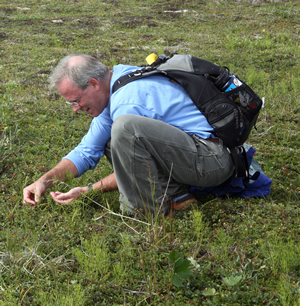Geneticist to seek obesity link in Alaska Natives
Geneticist to seek obesity link in Alaska Natives
Submitted by Diana Campbell
Phone: 907-474-5221
09/18/07

Download photo
A geneticist with the Center for Alaska Native Health Research at the University of Alaska Fairbanks has been awarded a $2.8 million grant from the National Institutes of Health to study how polyunsaturated fatty acids and physical activity may modify genetic risk factors thought to play a role in the development of obesity.
Bert Boyer, CANHR’s co-director and UAF associate professor of molecular biology, plans to take an exhaustive look at several genes among 1,000 Yup’iks who live in southwestern Alaska. The discovery of how polyunsaturated fatty acids and physical activity influence genetic risk factors could lead to a further understanding of obesity and help develop culturally meaningful interventions.
"Despite having levels of obesity that are similar to the general U.S. population, we are extremely interested in knowing why Yup’ik Eskimos have such low rates of diabetes and why many individuals appear so metabolically healthy," Boyer said. "We want to know the factors that keep people healthy and we think their significant consumption of fish, rich in [polyunsaturated fatty acids] might be a key component."
Polyunsaturated fatty acids are a healthy fat found in many foods such as marine mammals and fatty fish like salmon and are thought to prevent cardiovascular disease. Obesity is linked with diabetes and cardiovascular disease.
One of CANHR’s goals is to boost the number of independent researchers looking at health disparities among Alaska Natives. Boyer’s award, known as an R01 grant, is an achievement of that goal. He was one of the primary researchers during the first five years of CANHR’s existence and his work, along with that of other CANHR researchers, was instrumental in netting his new grant.
Boyer’s award is from NIH’s National Institute of Diabetes and Digestive and Kidney Diseases. It is in addition to another recent award to CANHR from the NIH’s National Institute for Research Resources: a five-year, $11 million grant to continue studies in diet and nutrition, cultural understandings of health, genetics of obesity, dietary biomarkers, stress and coping, contaminants in subsistence foods and cultural understanding of diabetes among Alaska Natives.
"Dr. Boyer’s grant award for an R01 strongly influenced our center’s ability to gain renewed funding," said Gerald Mohatt, CANHR’s director. "Additionally, this fulfills a promise that we made to our participants and the villages that we work with to return to continue the research and provide information to them on their health status. This process will give individuals and the community much more control over figuring out how to improve their health."
Boyer will spend the next five years on the genetic research.
"I am very excited about returning to the 10 communities we have worked in over the last five years," Boyer said. "It will be terrific to give our participants the opportunity to have follow-up screening and to see how their health status has changed.
"Yup’ik Elders have always felt that their subsistence foods and lifestyle are healthy and we want to give them scientific evidence that an active lifestyle and their diet rich in [polyunsaturated fatty acids] is indeed healthy. I think we have a whole lot to learn from our participants and this knowledge needs to be shared with our participants and the broader scientific community. "
CANHR, part of UAF’s Institute of Arctic Biology, was established in 2001 with an $11 million infrastructure-building grant from the NIH Center for Research Resources. That five-year grant helped establish CANHR researchers’ capacity to address current Alaska Native health issues by affording them an opportunity to collect a tremendous amount of preliminary data necessary to prepare a competitive R01 application.
Boyer came to UAF in 1992 and has received several prestigious grants for his work from the NIH, National Science Foundation, American Heart Association and the Department of Defense.
CONTACT: Bert Boyer, co-director, UAF Center for Alaska Native Health Research, at 907-474-7733 or via e-mail at ffbbb@uaf.edu. Diana Campbell, communication specialist, UAF Center for Alaska Native Health Research at 907-474-5221 or via e-mail at fndlc2@uaf.edu.
ON THE WEB: www.alaska.edu/canhr.


